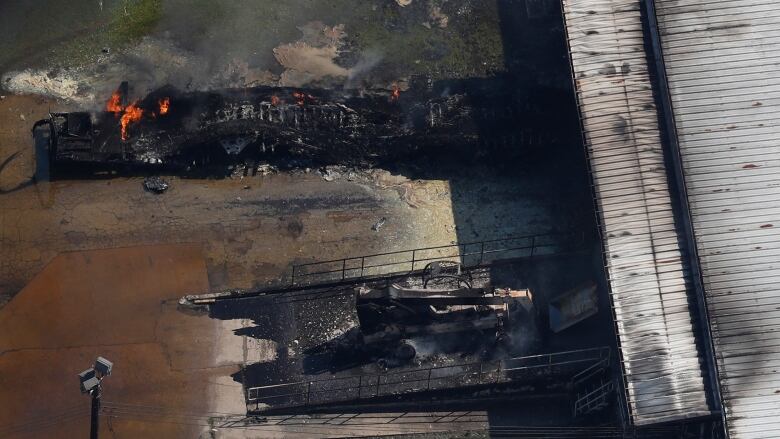Just how dangerous are those chemicals burning in Texas?
Organic peroxides, used to manufacture plastics, are explosive and flammable

A police deputy was sent to hospital after inhaling fumes from an explosion, fire and smoke at a flooded chemical plant outside Texas.
Nine others drove themselves to hospital as a precaution, the Harris County Sheriff's Office said.
One deputy taken to hospital after inhaling fumes from Archem plant in Crosby. 9 others drove themselves to hospital as precaution.
—@HCSOTexasThe plant produces chemicals called liquid organic peroxides that are very flammable and explosive.
"Some of our organic peroxides products burn if not stored at low temperature," the company said in a news release.
Organic peroxides are chemicals that contain "peroxy" the same component found in hydrogen peroxide (which, incidentally, is made at Arkema's Bcancour, Que., plant).
That chemical group is very unstable, which is why hydrogen peroxide is stored in brownbottles. When exposed to light, hydrogen peroxide tends to decompose into water and oxygen before you can use it.
The difference between organic peroxides and hydrogen peroxides is that organic peroxides contain carbon in addition to hydrogen, so theydecomposenot into water, but into flammable fuels.
"Most undiluted organic peroxides can catch fire easily and burn very rapidly and intensely. This is because they combine both fuel (carbon) and oxygen in the same compound," explains the Canadian Centre for Occuptional Health and Safety.

"They can decompose very rapidly or explosively if they are exposed to only slight heat, friction, mechanical shock or contamination with incompatible materials."
They can also cause other combustible materials to catch fire easily and burn intensely.
Because of the chemicals' flammability, the company says, "as agreed with public officials, the best course of action is to let the fire burn itself out."
How toxic?
There has been some debate about how toxic the smoke is at the chemical plant fire.
Arkema executive Richard Rennard told reporters the smoke is "certainly noxious." Rennard said the smoke came from burning hydrocarbons and incomplete combustion, "so any smoke is going to be an irritant."
Federal Emergency Management Agencyadministrator Brock Long told reporters that "by all means, the plume is incredibly dangerous."

However, Harris County Sheriff Ed Gonzalez, whose deputies went to hospital, said the smoke wasn't toxic or dangerousit had just irritated theofficers'eyes.
There are manykinds of organic peroxides, with different levels of toxicity and corrosiveness for example, benzoyl peroxide is harmless enough to be used as an acne treatment.
But methyl ethyl ketone peroxide, used to make certain plastics, is very toxic and may be fatal if inhaled, absorbed through the skinor swallowed, says CCOHS.
Like other fuels, when organic peroxides burn, they turn into carbon dioxide, water, and other compounds that also have different levels of toxicity.
In general, you should stay away from fuels that are burning and their smoke.
Arkema, which is headquartered in Colombes, France,says its liquid organic peroxides are used to make a variety of plastics and plastic resins that are used to manufacture such items as countertops, car parts and paints, pipes and styrofoam cups and plates.












_(720p).jpg)


 OFFICIAL HD MUSIC VIDEO.jpg)
.jpg)



























































































